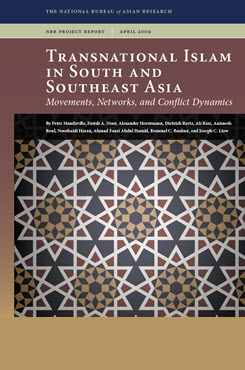From Transnational Islam in South and Southeast Asia: Movements, Networks, and Conflict Dynamics
Islamist Networks and Mainstream Politics in South and Southeast Asia
This essay assesses the role of transnational Islamist networks in South and Southeast Asia, paying particular attention to their impact on questions of religious and national identity throughout these regions.
EXECUTIVE SUMMARY
This essay assesses the role of transnational Islamist networks in South and Southeast Asia, paying particular attention to their impact on questions of religious and national identity throughout these regions. The essau argues that much of the current concern over Islamist politics in Asia is due to the mistaken assumption that religion has played a secondary role in the development of Asian society, and that much of what has determined the nation-building process in South and Southeast Asia has been the prerogatives of developmentalism and nationalism. Understanding the development and spread of religio-political networks across South and Southeast Asia today has to take into consideration the long historical precedent that laid the ground for the fertile development of religious-based politics currently underway in the region.
MAIN FINDINGS
While globalization processes have not invented pan-Islamic networks, they have aided their development. The result has been the creation of an increasingly well-connected global Islamic space that baffles the governmentality of nation-builders who are used to mainstream national politics with identifiable mainstream national actors and agents. Islamist networks throughout Asia have profited from this crisis of governmentality in many ways. They have assumed the mantle of the new anti-globalisation forces which was once the elected space of the nationalists. Islamists long to create a global pan-Islamic space where belonging to the same faith community is the only passport one needs to travel across the Muslim world unrestricted and remain comfortable in the safe confines of a Muslim universe. Though the Islamist project is sometimes couched in aggressive, if not militarist, terms of conquest and expansion, the yearning is fundamentally a mundane one. The history of South and Southeast Asia demonstrates that religious-based mobilization has been one of the most effective tools for gathering public support and ensuring public consensus for a range of political projects, the chief of which was the mobilization of Asians against colonial rule.
POLICY IMPLICATIONS
- Understanding the shift wherein the Islamist voices have come closer to the center stage of national politics in many Muslim countries means taking into consideration how and why globalization has actually helped to weaken the credibility and standing of the older generation of statist, developmentalist-oriented national leaders and ruling elite.
- Should the networking process of transnational Islamist groups embed itself to the point where it presents communities with new notions of identity (such as that of the universal Muslim subject), then the very notion of what constitutes a political mainstream itself may be undermined, questioned, or eroded.
- The network capabilities of Islamist groups will have serious implications on the national politics and mainstream public domain in their respective countries. Looking at how the localized conflicts in areas like southern Thailand, Kashmir, and the southern Philippines have now been elevated to the global level, it is vital to identify the workings of the globalization process and how such global networks have created this common pan-Islamic terrain with a unitary geography and real-time correspondence that does not recognize or stop at the frontiers of established nation-states.


